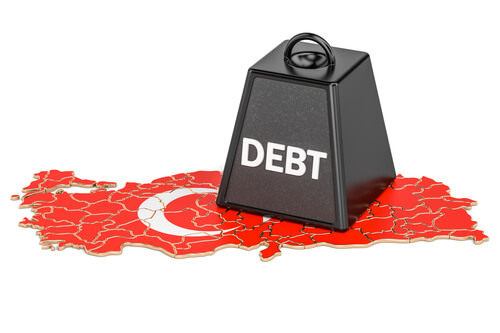(Bloomberg) — Turkey plans to shore up its battered banks by injecting capital into the biggest state-owned lenders for the second time in six months, according to people with direct knowledge of the matter.
Seeking to sustain the flow of credit into the slumping economy, the treasury is considering buying bonds that will be issued mostly by TC Ziraat Bankasi AS and Turkiye Halk Bankasi AS, said the people, who asked not to be identified because the talks are internal. The blueprint is likely to be announced by Treasury and Finance Minister Berat Albayrak on Wednesday.
Fresh capital may be pumped into the lenders to back President Recep Tayyip Erdogan’s efforts to prop up growth with cheap loans. The banks are being tasked with salvaging industries and helping consumers to pay off credit cards or get below-market rates on mortgages in the hope that private firms will follow. So far, no dice: a spike in bad loans and a surge in businesses seeking to restructure debt is causing their private counterparts to rein in credit.
Read more about the pile of bad loans stacking up for Turkish banks
The notes will qualify as Tier 1 or Tier 2 capital, the people said. Spokesmen for Turkey’s treasury and Ziraat Bank didn’t immediately respond to requests for comment. A Halkbank spokesman declined to comment when reached by phone.
Deja Vu
Lending by state-owned banks rose 8.1 percent in the first quarter of the year, while private banks expanded their books by 2.8 percent, according to the banking regulator data. But it has come at a cost. The combined profit of government-controlled firms fell 76 percent to 587 million liras ($103 million) in the first two months of 2019, compared with a year earlier. Capital adequacy ratios stood at 15 percent at the end of February — lower than the industry average of 17 percent.
The government has already recapitalized three of its banks by selling bonds to its unemployment fund in October. Two private banks, Akbank TAS, and Italy’s UniCredit SpA’s Turkey unit Yapi Kredi Bankasi, have also boosted their capital levels.
The shares of Halkbank and Turkiye Vakiflar Bankasi TAO rallied, gaining as much as 3.2 percent and 3.7 percent respectively. The 13-member Borsa Istanbul Banks Sector Index climbed as much as 2.7 percent, outperforming the 1.2 percent advance in the benchmark index.
Banks in the country are being held back by record high loan-to-deposit ratios after a credit binge in 2017 stoked by a state-backed fund that guaranteed some loans. That’s come to bite lenders and borrowers alike after a plunge in the lira pushed up the cost of servicing loans in dollars or euros, while also making it more expensive for banks to raise offshore capital.



